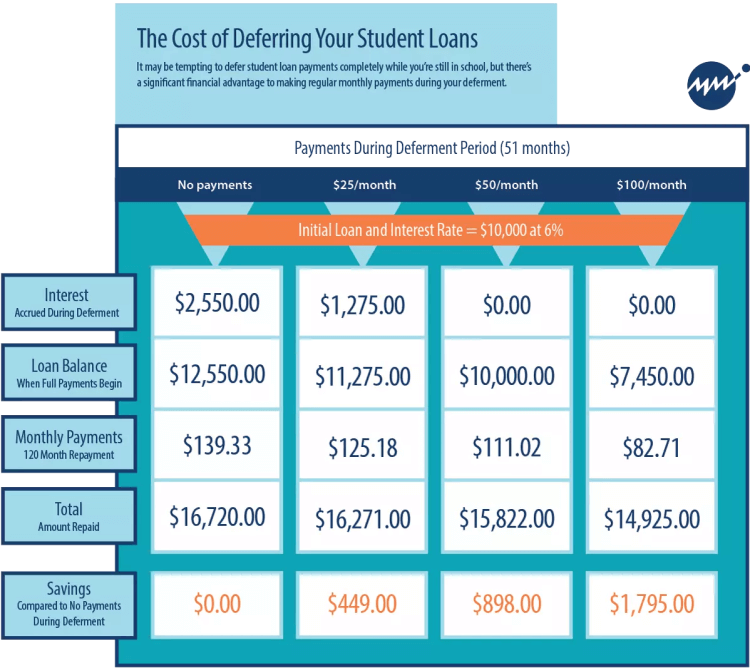The case against deferring your student loan payments

Student loan borrowers may have the option to defer their payments while they’re enrolled at least half-time and during a grace period after leaving school. Parents who take out a loan for their child may also be given the same options. However, deferring your payments might be a decision that comes back to bite you later.
What is student loan deferment?
“Deferment is a feature that student loans have that’s not really offered on other types of loans,” says Barbara Thomas, executive vice president of SouthEast Bank and head of the bank’s Education Loan Finance division, a student loan refinancing lender.
“It was initially designed for students who don’t have a source of income and can’t afford to make payments,” she says. To allow students to focus on completing their degree, the lender temporarily allows borrowers to put off making payments until after they leave school.
The terms of when and how deferment work can vary depending on whether you’re taking out a federal or private student loan and what type of degree you or your child are pursuing. You be able to put your loans into deferment while you’re in school, during a grace period after leaving school, if you return to school, become disabled, are unemployed, if you’re on active duty military service, and in some other situations.
Aside from subsidized federal student loans, interest will accrue on your loans while you’re deferring payments. As a result, you could graduate with more debt than you took out.
Student loan interest rates, accrual, and capitalization.
Congress determines the interest rate on federal student loan, which can vary depending on whether you’re an undergraduate, graduate or professional student, or parent of a student. Currently, all federal student loans have a fixed interest rate, meaning the rate won’t change once the loan is disbursed.
Private student loans are offered with either fixed or variable rates, and your interest rate can depend on the lender and your creditworthiness. If you take out a variable-rate loan, the interest rate may rise or fall in the future if the benchmark rate that your loan’s rate depends on rises or falls.
The interest on student loans doesn’t compound while your loans are in deferment. By contrast, if you have a credit card, generally the interest that accrues today will be added to your balance. Tomorrow, the interest rate will apply to your new balance, and slightly more interest will accrue.
With student loans, the interest rate applies to your loan’s principal (the amount you borrowed) while your loan is in deferment, but the interest isn’t added to your principal during this period. So, you don’t get charged interest on the interest. However, when you start making your full payments, all the interest that accrued will capitalize and be added to your loan’s principal.
“Undergraduates, in particular, don’t understand how (capitalization) works,” says Thomas. “They’ll wind up with a higher loan balance and higher monthly payment.” Also, since your principal balance is larger, you’ll accrue more interest each month.
The same process can occur if you put your loans back into deferment, or temporarily stop making payments while they’re in forbearance, in the future.
The cost of deferring your payments.
To understand the potential impact of deferring your payments versus making monthly payments while you’re in school, we compared several scenarios. A few factors remain the same in each:
- A student borrows $10,000 with a 6 percent interest rate at the start of a four-year program.
- There’s a 51-month deferral period (45 months in school plus a six-month grace period).
- Once the grace period ends, the loan has a 10-year (120-month) repayment period.
We used the following tools to help in our calculations, and you can use them as well to figure out the numbers for your specific situation.
- Sallie Mae, a private student lender, has a calculator you can use to determine how much interest will accrue during deferment, and how making early payments could affect the interest accrual.
- The New York Times’s student loan calculator can help you determine the monthly payments and cost of paying off your loan once the full payments start.
While real students often take out new loans at the start of each school term rather than one large loan at the beginning, the example shows how even making modest $25 monthly payments could lead to significant long-term savings. Also, the in-deferment payments can help lower your required monthly payments later, which could make it easier to manage your budget after graduation.
Is deferring your payments ever a good idea?
It’s easy to talk about making payments while you’re in school but being able to afford them can be a different matter. After all, you’re taking out student loans because you need money to pay for school.
“If you don’t have discretionary income, then deferring your payments makes sense,” says Thomas. “You may have no other option.”
However, many graduate students, professional students, and parents of students are working and have an income. Even some undergraduates may have a modest income. “If you can afford to spend $25 to $50 a month on discretionary spending, then why can’t you put that money towards a loan?” asks Thomas. Doing so could save you a lot of money in the long run.
If you’re currently considering student loans, in school, or repaying your student loans and want assistance understanding your options, consider speaking with one of Money Management International’s trained student loan counselors. They can offer a one-on-one review and analysis of your situation, and give you recommendations based on your unique situation.

















